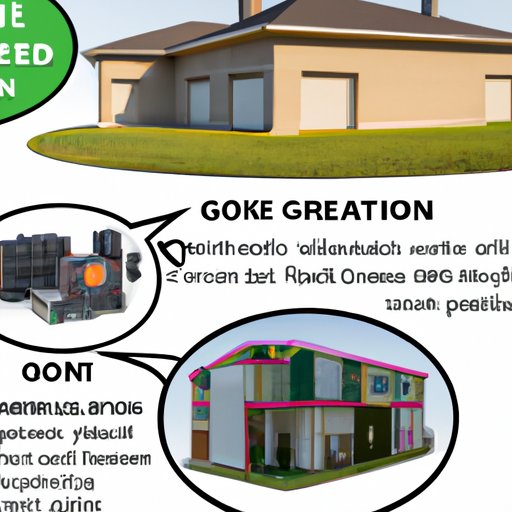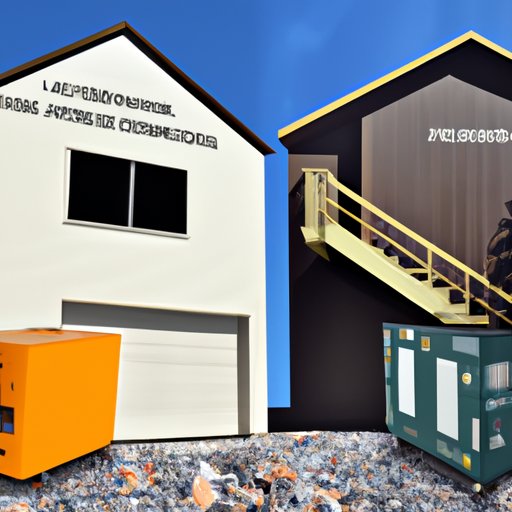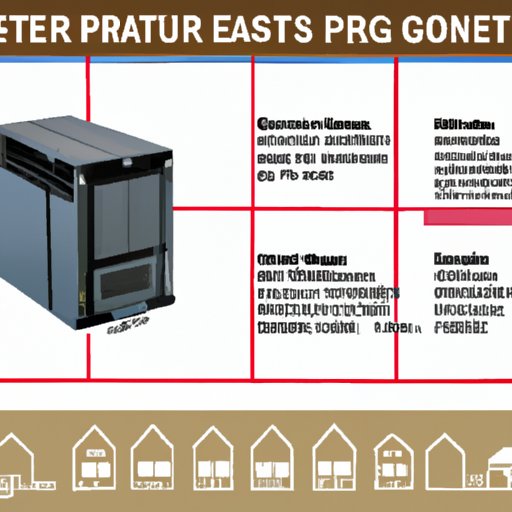Introduction
A whole house generator is a powerful and reliable source of backup power. It can provide electricity to your entire home during a power outage, ensuring that you have access to heat, air conditioning, lights, refrigeration, and other essential appliances. However, whole house generators come with a hefty price tag, so it’s important to understand the cost before making a purchase.
A Comprehensive Look at the Price Tag of Whole House Generators
When shopping for a whole house generator, there are several factors that will influence the cost. Some of these include the size of the generator, the type of generator, the fuel source, the quality of the generator, installation costs, and maintenance costs.
Size of Generator
The size of the generator will be one of the most significant factors in determining the cost. Generally, larger generators are more expensive than smaller models. The size of the generator should be determined based on the wattage requirements of the devices and appliances that need to be powered. For example, a 15kW generator would be suitable for powering a 4-bedroom home, while a 7.5kW generator may suffice for a 2-bedroom home.
Type of Generator
The type of generator will also impact the cost. Portable generators are generally less expensive than standby generators, but they offer less power and require more manual labor to set up. Standby generators are permanently installed outside and automatically turn on during a power outage, but they require professional installation and higher upfront costs. A study by Consumer Reports found that prices for portable generators range from $300 to $1,000, while standby generators can cost anywhere from $2,000 to $10,000.
Fuel Source
The type of fuel used by the generator will also affect the cost. Gasoline, diesel, and propane are all common fuel sources for generators. According to experts, gas generators tend to be the least expensive option, followed by diesel and then propane. Fuel costs should also be taken into account when considering the overall cost of a whole house generator.
Quality of Generator
The quality of the generator is another factor that will influence the cost. Cheaper models are often made with lower grade materials and may not last as long as more expensive models. It’s important to research different brands and compare warranties before making a purchase.
Installation Costs
Installation costs should also be taken into consideration when researching the cost of a whole house generator. Professional installation can cost anywhere from $500 to $2,500, depending on the complexity of the job. This includes the cost of running electrical wiring, connecting the generator to the home’s power system, and any other necessary work.
Maintenance Costs
In addition to the initial cost of the generator, there are ongoing costs associated with its maintenance. Generators should be inspected and serviced at least once a year. This typically involves replacing the fuel filter, spark plugs, and oil. Depending on the size and type of generator, this can cost anywhere from $100 to $500.
The Cost of Power: How Much Does a Whole House Generator Cost?
The cost of a whole house generator can vary greatly depending on the size, type, fuel source, and quality of the generator. On average, a basic 7.5kW generator can cost between $2,500 and $4,000, while a more high-end 15kW generator can cost between $7,000 and $10,000. Installation costs should also be taken into consideration, as they can add another $500 to $2,500 to the total cost.

Shopping for Power: What to Expect When Buying a Whole House Generator
When shopping for a whole house generator, it’s important to do your research and shop around for the best deal. Start by researching different brands and comparing features, such as power output, noise levels, and warranties. Once you’ve narrowed down your choices, contact multiple companies to get quotes and compare prices. Be sure to ask about any additional fees, such as installation or delivery.
What Are Your Options? Understanding the Price Points for Whole House Generators
When it comes to whole house generators, there are three main categories: basic, mid-level, and high-end. Basic generators are typically 7.5kW models and can cost between $2,500 and $4,000. Mid-level generators are usually 10kW models and can cost between $4,500 and $6,000. High-end generators are typically 15kW models and can cost between $7,000 and $10,000.

Investing in Backup Power: Exploring the Price Range for Whole House Generators
When exploring the price range for whole house generators, it’s important to compare prices across brands. Some brands may offer better value for money than others, so it’s worth doing some research to find the best deal. Additionally, consider any additional features that may be offered, such as remote monitoring or automatic transfer switches. These features can add to the cost, but they can also provide greater convenience and peace of mind.

Calculating the Total Cost of Owning a Whole House Generator
When calculating the total cost of owning a whole house generator, it’s important to take into account both the initial investment and the long-term operating costs. The initial cost includes the cost of the generator, installation, and any additional features. Long-term operating costs include regular maintenance and fuel costs.
Staying Prepared: Balancing Budget with Quality When Shopping for a Whole House Generator
Finding the right balance between budget and quality is essential when shopping for a whole house generator. It’s important to invest in a generator that is reliable and of good quality, but it’s also important to stay within your budget. Consider exploring financing options, such as payment plans or credit cards, to help spread out the cost over time.
Conclusion
Whole house generators provide reliable and convenient backup power to homes during power outages. The cost of a whole house generator depends on several factors, including size, type, fuel source, quality, installation costs, and maintenance costs. Prices range from $2,500 to $10,000, but it’s important to do your research and shop around for the best deal. Additionally, consider the long-term operating costs, such as fuel and maintenance, when calculating the total cost of ownership.
(Note: Is this article not meeting your expectations? Do you have knowledge or insights to share? Unlock new opportunities and expand your reach by joining our authors team. Click Registration to join us and share your expertise with our readers.)
